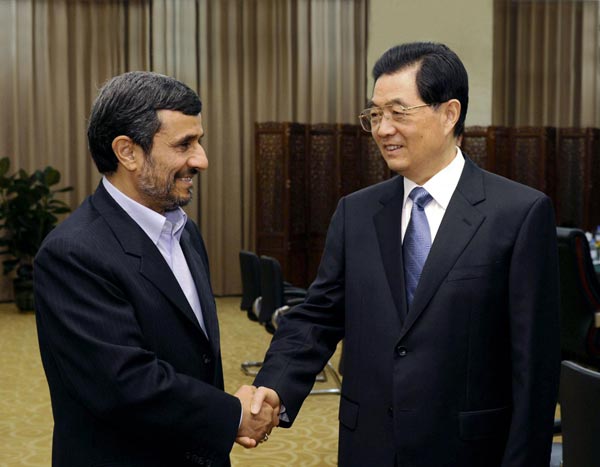Foreign and Military Affairs
Dialogue key to solve Iran issue
By Wu Jiao (China Daily)
Updated: 2011-06-15 07:00
 |
Large Medium Small |
ASTANA, Kazakhstan - President Hu Jintao urged Iran on Tuesday to seize "positive factors" that will accelerate the dialogue necessary for resolving the country's nuclear issue.
"To properly solve the Iran nuclear issue through dialogue and negotiation is the fundamental way to ensure Iran's right of peacefully utilizing nuclear power," Hu said during a meeting with Iranian President Mahmoud Ahmadinejad.
 |
|
Chinese President Hu Jintao shakes hands with Iranian President Mahmoud Ahmadinejad in Astana, capital of Kazakhstan, June 14, 2011. [Photo/Xinhua] |
"It not only serves the interests of Iran, but also helps peace and stability in the Middle East," Hu said.
| ||||
Hu also urged Iran to "take concrete steps to establish trust, and accelerate the process of dialogue".
Ahmadinejad said Iran is willing to settle the nuclear issue through talks and cooperation, and is ready to talk with the six countries, according to a Foreign Ministry release after the meeting.
"Iran is willing to communicate with China on the issue," Ahmadinejad was quoted as saying.
The Iranian president was in the Kazakh capital, Astana, for the annual meeting of the Shanghai Cooperation Organization (SCO) that brings together leaders of the bloc's six member states, China, Russia, Kazakhstan, Uzbekistan, Kyrgyzstan and Tajikistan.
Iran is one of four observers at the SCO. The other three are India, Pakistan and Mongolia.
Iran has been accused by the United States and other Western countries of developing nuclear weapons under the cover of civilian use, and the UN Security Council has imposed sanctions against Teheran for uranium enrichment activities.
But Teheran insists that its nuclear program is peaceful and solely for civilian use.
China and Russia, two permanent members of the UN Security Council, have been calling for talks to solve the issue.
"China respects Iran's right to a civilian nuclear program, but also believes it has to fulfill the international obligation of non-proliferation," said Ye Hailin, a scholar with the Chinese Academy of Social Sciences.
He added that in the process of solving the nuclear issue, it is important to ensure non-proliferation while maintaining peace and stability in the Middle East.
Jia Xiudong, a researcher with the China Institute of International Studies, noted that China is not in favor of imposing sanctions but wants to build trust. "China's position on sanctions is clear. It opposes full-scale sanctions," Jia said.
Experts also believe that, apart from the nuclear issue, the development of Sino-Iranian relations was the focus of the Tuesday meeting.
China and Iran celebrate the 40th anniversary of diplomatic relations this year. Iran, along with Saudi Arabia, has become a major oil supplier to China.
"As the world's political landscape undergoes profound changes, to consolidate and develop a friendly cooperative relationship between China and Iran is in the common interests of the two countries," Hu said during the meeting.
Qin Jize in Beijing contributed to this story.
| 分享按鈕 |



